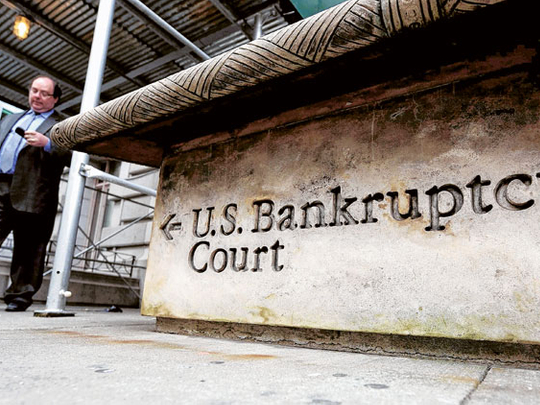
Dubai: Bankruptcy proceedings have an inevitable air of finality about them. They dissect the circumstances that led a business to crash and burn. What often remains unsaid are the dashed hopes and aspirations of the promoters and employees alike.
In other words, there was no option of a second chance. Not anymore, if the proposed UAE Bankruptcy Law comes into effect with full force.
For the country's small and medium-sized businesses the new law does give them some time to try to turn things around.
And time is, no doubt, of the essence.
According to legal sources, the law states that during the bankruptcy declaration procedure, the court-appointed trustee must prepare and submit a report stating whether there is a reasonable possibility to reorganise the business.
The court will then hold a hearing of the debtor and creditors and either assign the trustee to prepare a reorganisation plan for the business or issue an order for liquidation.
Willingness to continue
"The law requires the debtor to express a willingness to continue the business to the court," said Mustafa Zafeer O.V., managing partner at the law firm Musthafa and Almana.
"The court can allow such requests if it finds there is a possibility that it would make profits within a reasonable time according to the size and nature of the business and the quantum of its indebtedness."
All of which represent a major departure from the present situation in which, if a business finds itself facing bankruptcy, that is more or less the end of it.
The timing of the new law could prove to be a lifesaver for many small businesses, which have yet find their feet in the marketplace.
"There are many businesses, especially those which depend overwhelmingly on the construction sector, that are really struggling to stay operational and [are] saddled with debts," said a consultant who advises entrepreneurs on refinancing their debts.
"A bankruptcy law would have a special appeal for them under the circumstances."
Apart from the leniency of offering more time, there is one other provision in the law that certainly could help businesses in their time of need.
"The trustee may apply to the court on behalf of the debtor to obtain new finance — with or without security — during the bankruptcy procedures," Zafeer said.
"The court can grant such permission… but only for the purpose of ensuring the continuity of the works of the debtor.
There are ample provisions in the insolvency law to protect the interests of both debtors and creditors."
Such provisions will go a long way to assuring businesses that there can be life after bankruptcy.
In this respect, the UAE Bankruptcy Law has a lot in common with the legal regime in the United States, according to local lawyers.
But some legal sources say patience is necessary until the UAE law comes into effect.
Speculation
"The new law has not been finalised yet — so it's all speculation at this stage," said a spokesperson at the firm Taylor Wessing.
"All we can say at the moment is that it is expected that the law will provide a more clear and streamlined procedure for filing for bankruptcy, and will also provide a platform for [the] rehabilitation of companies as an alternative to dissolution. At the moment, there are not really any legal provisions which support company rehabilitation in the UAE."
So, whatever finally emerges by way of the UAE Bankruptcy Law would represent significant progress from the status quo.
Managing insolvency: How to go about it
According to the putative Bankruptcy Law, a person or entity may seek bankruptcy if they find themselves burdened with excessive debts or have not paid back creditors over the six-month period prior to filing for bankruptcy.
The court can then appoint a bankruptcy trustee, who will manage the business of the debtor during the bankruptcy procedures. He will also act as an agent on behalf of the debtor but not bear any personal liability to third parties.
The court may order the trustee to receive and keep all the correspondence of the debtor and assume them during the procedures.
The law also states that during the bankruptcy declaration procedure, the trustee must prepare a report and submit it to the court which will state whether there is reasonable possibility of reorganising the business.
.












